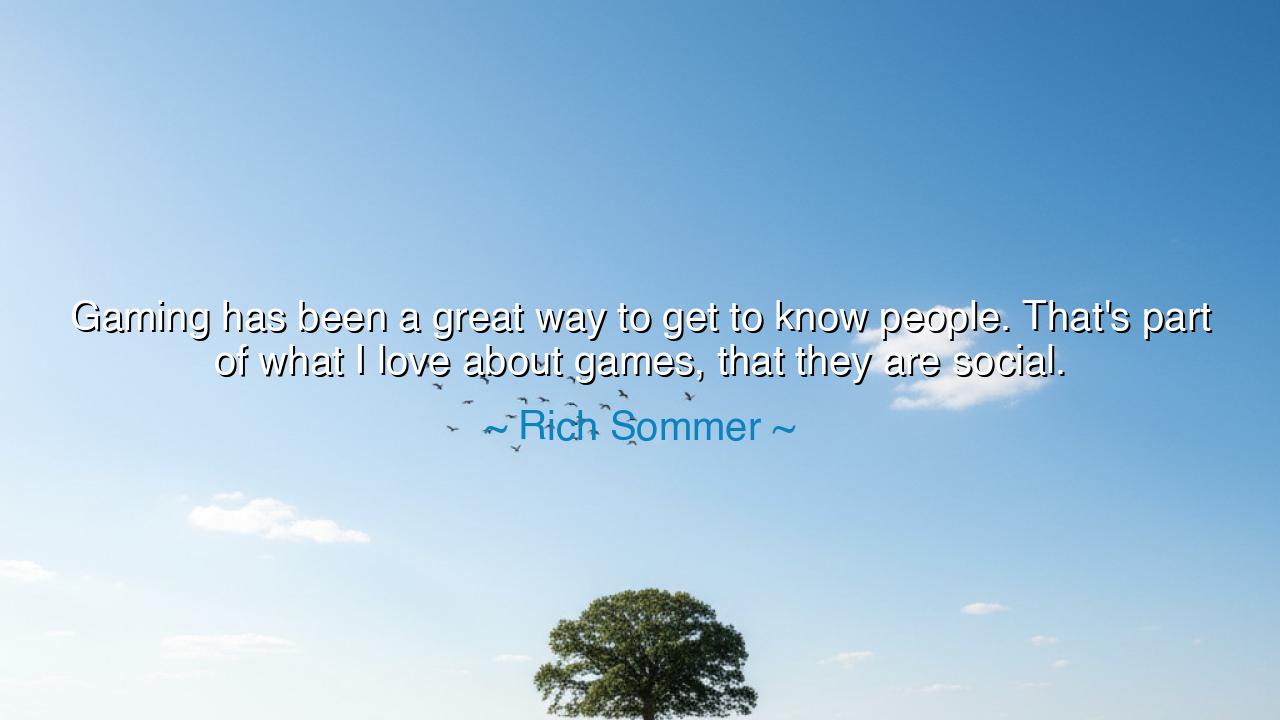
Gaming has been a great way to get to know people. That's part of
Gaming has been a great way to get to know people. That's part of what I love about games, that they are social.






When Rich Sommer said, “Gaming has been a great way to get to know people. That's part of what I love about games, that they are social,” he was not merely speaking of a pastime, but of one of humanity’s oldest and most sacred arts — the art of connection through play. Beneath the surface of his words lies a truth that the ancients knew well: that the games people share are reflections of their souls, and that through play, they reveal not only their wit and skill, but their character, courage, and heart. Sommer’s insight reminds us that gaming — whether on a digital screen or around a humble table — is not a solitary escape from life, but a bridge between lives.
The origin of this thought springs from Sommer’s own journey as both an actor and a devoted lover of tabletop games. Known for his role in Mad Men, he also became a prominent voice in the gaming community, advocating for the social and creative bonds that games nurture. His experience taught him what philosophers of old had long understood — that in the act of play, human beings are at once most natural and most noble. The Greek thinker Plato once said, “You can discover more about a person in an hour of play than in a year of conversation.” Sommer’s words echo this timeless wisdom, for he sees in games not competition alone, but communion — a place where friendship is forged not through speeches, but through shared experience and laughter.
There is something deeply human, even ancient, in this idea. Long before cities rose or nations formed, people gathered around fires to tell stories, throw stones, and carve patterns in the dust — all forms of play. These early games were more than diversions; they were the training ground of trust, a way to test one another’s honesty, patience, and cooperation. In Egypt, archaeologists unearthed the game of Senet, played five thousand years ago — not for idle pleasure, but as a symbolic journey of the soul through life and death. Across ages and cultures, from chess in India to go in China to dice among the Romans, play has been sacred because it binds people together, allowing them to confront fate and fortune side by side.
Sommer’s quote also speaks to a deeper truth of the modern age — that in an era of noise and distance, games restore intimacy. They invite us to sit face to face, to share risk and reward, to listen and to act. Whether one plays a strategy game over a glowing screen or a board game across a wooden table, the essence is the same: two or more minds entering into harmony through rules and imagination. In a world divided by fear and misunderstanding, such harmony is no small thing. It is an act of healing. For as Sommer suggests, gaming is social not only in form, but in spirit — a reminder that joy is multiplied when shared.
One might think of the fellowship of the medieval knights, who would test their courage not only in war but in sport. Tournaments and games were the proving grounds of loyalty, valor, and camaraderie. Or consider the Japanese samurai, who saw in the game of Go a reflection of strategy, patience, and honor. To play was to learn restraint, wisdom, and foresight. These examples show that play, when noble in spirit, becomes a mirror of virtue. Sommer’s love for gaming springs from this same recognition — that even in something as simple as rolling dice or moving pieces, one glimpses the eternal dance of human nature: ambition tempered by joy, rivalry softened by laughter, victory redeemed by humility.
Yet Sommer’s words also offer a lesson of the heart: that play is not childish, but essential. Too often, adulthood drives out the joy of shared play, replacing it with isolation and pride. But the wise know that the soul remains young only when it continues to play — not idly, but meaningfully, in company and in wonder. Games, like music or storytelling, renew the bonds of kinship that modern life frays. They teach us to lose gracefully, to win honorably, and to delight in the company of others. Through them, we remember that life itself is a kind of game — uncertain, changing, filled with challenge, yet made beautiful by companionship.
So, my child, learn from Rich Sommer’s wisdom: seek play not as distraction, but as communion. When you sit to play, do so with presence, generosity, and curiosity. Listen more than you boast, learn more than you teach, and laugh more than you win. For every game is a small world, and every player within it a reflection of the greater world beyond. To play with others is to know them, and in knowing them, to know yourself. Thus, as the ancients taught and Sommer reminds us — never forget that the heart of all play is not victory, but connection. For the greatest game of all is life itself, and it is best played — together.






AAdministratorAdministrator
Welcome, honored guests. Please leave a comment, we will respond soon